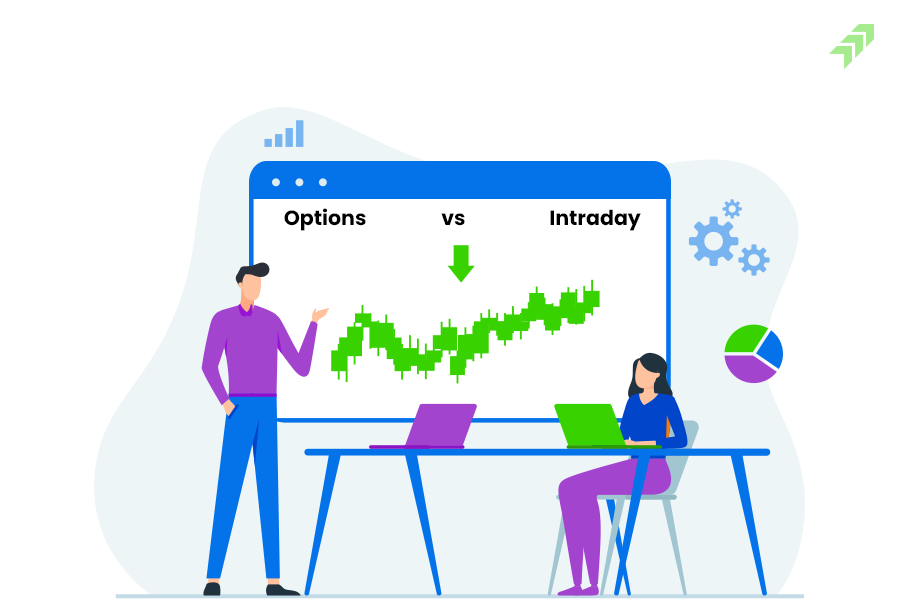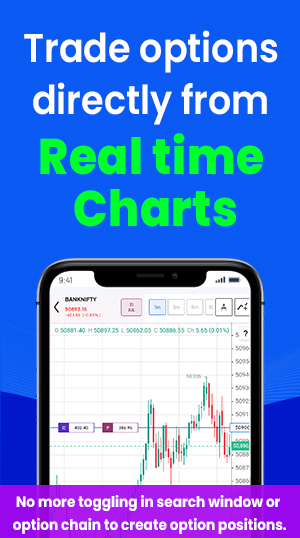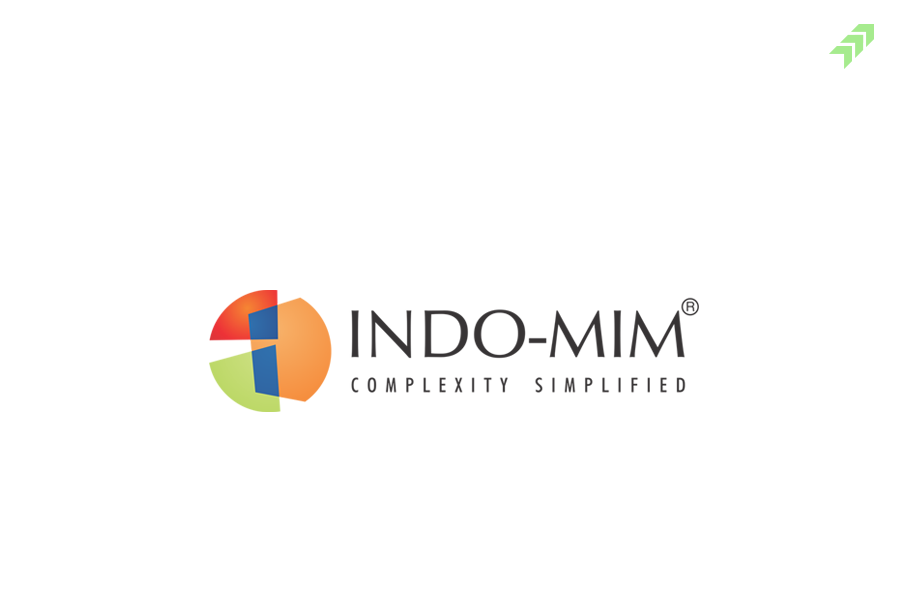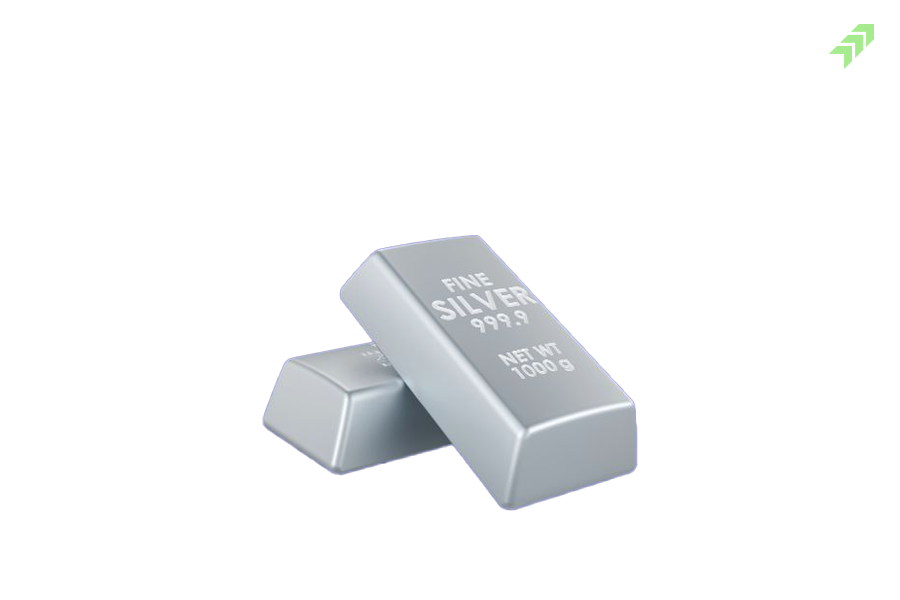In trading, you can choose among various approaches/strategies fit according to your financial capacity and risk profile. Among these are option trading and Intraday trading, which can yield exponential returns in very less time if done correctly. Although both are sybilised as two edged swords, nevertheless, both kinds of trading are rather popular among the traders worldwide as they can yield quick returns.
How would you pick which of intraday trading and option trading is better or more fit for you? Here you have to understand the differences and benefits and drawbacks of option and intraday trading. Choosing the ideal method of trading would be simple after you understood the advantages and drawbacks of both approaches.
What is Intraday Trading?
In intraday trading, you must buy or sell or vice versa in an underlying on the same day. This means that, should you have made any intraday trades, you must square-off your position in the same quantity on the same day within the trading hours before the market closes.
Also Read: How to Do Intraday Trading: Best Stocks, Charts & Strategies
In case you forget to square-off your intraday position, your broker will automatically square of your position on your behalf, either for profit or loss. The intraday trade is only settled for profit or loss, thus delivery of underlying does not occur between the buyers and sellers.
The stock price in intraday trading is mainly influenced by the volatility in the market and systematic or unsystematic risk associated with the stock. You can use technical indicators, and candlestick chart patterns to find the stocks for intraday trading.
Advantages of Intraday Trading:
Quick Profits: One of the best advantages of intraday trading is you can earn profits in one day, making your trade positions or investment a high rate of return strategy. As you have to close and exit from your trade position on the same day, you can’t carry forward your trade position as you are not allowed to take delivery of shares in intraday trading.
Also Read: Top 5 Best Technical Indicators for Intraday or Day Trading
High Margins: For intraday trading brokers allow margins up to 10 to 20 times the funds available with them for trading. This means you can trade in high trade value even though you don’t have much capital to fund your trade. This kind of leverage provides intraday trading a high-return investment if your trade position manages to book profits.
Short Sell: In a falling market you can make hay while the sun shines, yes trading intraday has another advantage. As in day trading, you don’t need to deliver any shares if you sell any stock, because you will buy again the same on the same day. Hence, you can short-sell, stocks in a downtrend and earn profits from the falling market.
High Liquidity: Your trade position in intraday trading liquidated end of the day provides high liquidity, allowing you to enter into a new trade position. The trade position is in profit or loss, but it will be squared off and your fund will be available for the next trade.
No Overnight Risk: Stock markets globally are also influenced by the significant movement in the global market indices. But in intraday trading, all trade positions are closed before the market closes. This protects you from the overnight risk of market movements influenced by such factors.
Disadvantages of Intraday Trading:
Limited Time
In intraday trading, you have only one day to enter and exit from your trade position. If the underlying doesn’t move according to your assumptions during intraday and you are hopeful of volatile move, there is no scope to carry forward your trade position. You have to square off your position either with small profit or loss.
Also Read: How to Select Stocks for Intraday One Day Before: 10 Tips
High Volatility
The stock price in intraday trading can show abrupt movement, if the market is volatile, your trade position can also see the volatility in the stock price movement. Hence, trading in intraday you might face the volatility that can cause you losses if not managed professionally.
Highly Risky
A trader can earn from both volatile and range bound market. It is not always necessary that market will move as per your assumption. During a day, you assumed a range bound scenario for market but if the market suddenly gives a directional move and that move if went against your assumption, can give you big losses.
Time for Analysis
To find the best stocks for intraday trading you should perform the technical analysis, and in intraday, you don’t have enough time on the same day. However, you can find the momentum stocks but if you waste time in analysis, you can miss the opportunity to grab the stock at the right levels, as in intraday there is limited time for the movement.
Overtrading Habit: Some traders are obsessed with intraday trading, they enter into multiple trades at the same time or frequently enter and exit from their trade positions. This kind of overtrading habit increases their trading cost because of the brokerage fees and transaction charges.
High Skills & Knowledge
Trading in intraday needs specific skill set and years of experience of watching the market. If you are a beginner in the stock market, you should start with swing trading and get habitual with reading candles, identifying chart patterns, and other essential concept. It is recommended for beginners to stay away from intraday trading. As described earlier, intraday trading is risky and time-bound approach so footing in wrong shoes can destroy your confidence and your hard earned capital. Only experienced and highly skilled traders can make profits from the intraday trading.
What is Option Trading?
Option trading is totally different from intraday trading. It is a part of another segment called the derivatives market, in which only a few limited designated underlying securities are allowed to trade. In option trading option buyers and sellers both enter into a derivative contract to buy or sell the underlying security with a specific strike price within the expiration date.
Also Read: Options Trading: How it Works, Example & How to Trade
In option trading, you can find call options and put options, in which the option buyer enters into the option contract with the right to buy the underlying security at a specified strike price. On the other hand, an option seller enters into the contract with obligations to sell the option contract at the specified strike price within a specific expiration period.
Also Read: How to Choose or Pick the Right Strike Price in Option Trading
In option trading, the premium is called the price of the option. The price of premium is affected by various factors like strike chosen, volatility, time to expiry, etc. The expiry of the option contract can be weekly or monthly with a wide range of strike prices that you can choose as per your trading strategy, and availability of the funds.
Also Read: What are the Delta, Gamma, Theta and Vega in Option Trading
Advantages of Options Trading:
Wide Options to Choose
As the name refers, in option trading you can find wide options to trade. Yes, apart from the main indices, you can have multiple underlying securities of different strike prices available for trading in the future and options market. You can choose to buy or sell the call option or put option or trade with the combination of multiple trade positions.
Also Read: Best Technical Indicators for Option Trading in TradingView
Trade Diversification: In option trading, you can enter into multiple options, depending on the market conditions. You can enter into a long position or short position or enter into both types of trade positions making your trading strategy well diversified to avoid major risks. In option trading, you can diversify your trade by entering into multiple trades at the same time.
Hedge Your Positions
Initially, option trading was meant for hedging purposes, but now also used for trading. Suppose you have a holding of stocks of a company and in the short term the price is likely to fall, but you don’t want to sell the stocks, then you can enter into put options to take advantage of the falling price, even without selling your shareholdings into the stocks.
Potential of High Returns
The option price better known as the option premium is highly volatile in nature, as there are various factors that affect the option price. Apart from the spot price of the underlying security, the time decay, volatility and demand and supply affect the option price. It can give very high returns compared to intraday or positional trading.
Low Capital & Cost-effective
In option trading, you don’t need to pay the full amount of a number of quantities you bought in option buying. The option contracts are defined in the lot size and you have to pay the amount as per the option price and lot size. Until and unless the option is exercised you don’t need to the full value of the contract, and when the contract expires, the settlement is done on the basis of the buying and selling price of the option premium.
Disadvantages of Option Trading:
Highly Volatile Market
The price of the option calls and puts is highly volatile, as there are many factors that affect the option price. Due to this, the price of the option premium fluctuates at very high speed making it sometimes difficult to enter into the trade position at the right levels. Volatility can be good for the option buyers but not for the option sellers.
Very High-Risk Trade
During a volatile market option premium rises or fall in multiples. You can see option premium multiplying x, 2x and even 3x in very short period. So because of the sudden high volatility option trading can be very risky, especially for the new comers. In options trading you can lose your entire trade value, if the option price moves against your expectations or there is no movement in the underlying security option price becomes zero.
Limited Stocks Available
In F&O segment only a few limited stocks are allowed to trade that are highly active with high trade volume and liquidity in the market. Hence, to trade in options you have to choose from these limited underlying securities or from the market indices.
Also Read: How to Select Best Stock for Option Trading: Points to Consider
Affected by Time Decay
Time decay is one of the biggest enemies in reducing the option premium price, even if the spot price of the underlying security remains the same.Yes, as soon as the option contract expiry date arrives, the option premium becomes worthless.
High Trading Charges
In option trading usually you have to enter into multiple trade positions at the same time so that you can get the maximum profits in various market conditions. This multiple trading also increases your trading charges, as you have to pay the brokerage and transaction fees for each trade, which can also affect your rate of returns from options trading.
High Funds Required
When you sell the options, you have to deposit the margin money of the total trade value of your option trade position. If you don’t have sufficient funds then you cannot sell options without depositing the margin money and only buying the options could be risky to trade.
Risk of Losing Funds
In option trading, if you bought an option contract and not exited from the trading position before the expiry, it will become zero. When the option price becomes zero your trade position will become worthless, resulting you lose entire money spent on the option contract.
Complicated Strategies
One of the biggest disadvantages of option trading understanding that option strategies are not easy for normal traders. You should have knowledge of different types of option strategies, how strategies work and can give profits in various market conditions.
Also Read: Best Option Strategy for Bearish Market: 7 Option Strategies
Trading with complex option strategies are very complicated to understand, as there are various factors like change in open interest etc. that influence the option price and when you have to trade with multiple trade positions in a single strategy then it becomes more complex.
Conclusion: Which is Best Option Trading or Intraday Trading?
Both option trading and intraday trading are the very short-term trading style. However, in option trading, you can carry your trade position up to a week or months, while intraday trading is only for a day period. In intraday trading, you have to close your trade position on the same day either you earn the profits or incur the losses.
However, in intraday trading, you can enjoy the high leverage due to multiple times of margins allowed by the brokers. While option trading you will not enjoy such a facility, even at the time of selling the option contracts you have to deposit a high amount of money as a margin to place your trading order. Hence intraday trading you with limited funds, but for option trading, you need sufficient money to enter into multiple trade positions.
Also Read: What is F&O Margin Penalty: SEBI Rules & How to Avoid it
However, in intraday trading, you can earn a profit in one day, while in option trading you might have to wait up to for the month. In intraday trading, you can incur some of the percentage of loss, but in options, you lose your entire money if not exited timely and the option contract becomes worthless on the day of expiry. However, for option sellers, it is a profitable situation.
Most importantly if you don’t have proper knowledge and experience of option Greeks and various other factors that drive the option market, then it is not your game. In intraday trading, you can bet on momentum stocks, trending stocks or stocks in the news, but in option trading, you have limited stocks to trade, as the main volume of trade is in the market index.
Choosing between option trading and intraday trading totally depends on your investment goals, risk-bearing capability, funds availability and the time period you can wait to get returns from your trade positions. Both have pros and cons, you have to choose wisely which one is better for you and can give you positive returns in various market conditions.

















